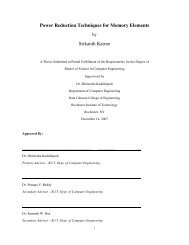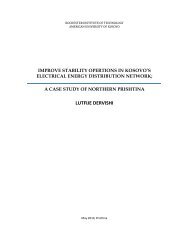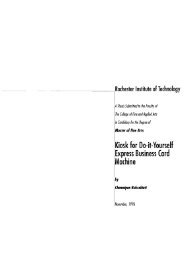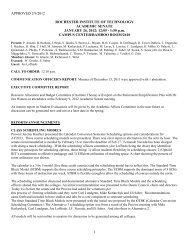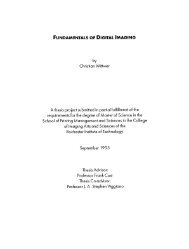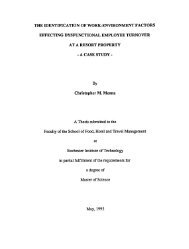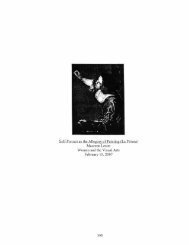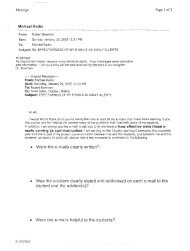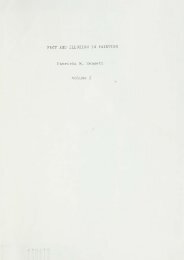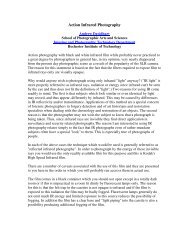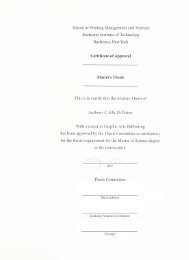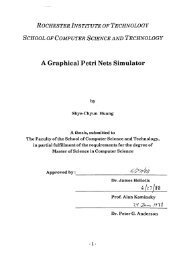Sophism and Moral Agnosticism, Or, How to Tell a Relativist from a ...
Sophism and Moral Agnosticism, Or, How to Tell a Relativist from a ...
Sophism and Moral Agnosticism, Or, How to Tell a Relativist from a ...
You also want an ePaper? Increase the reach of your titles
YUMPU automatically turns print PDFs into web optimized ePapers that Google loves.
THE PLURALIST 6: I 20II<br />
way <strong>from</strong> within a tradition are precisely what enable us <strong>to</strong> show how<br />
the relativist challenge is misconceived. (Whose Justice? 363-64)<br />
MacIntyre certifies that a claim has "warranted asserrability" insofar as it<br />
remains coherent within the conceptual framework <strong>from</strong> which it is made.<br />
An analysis of MacIntyre's preliminary arguments leads <strong>to</strong> the conclusion<br />
that all he can hope <strong>to</strong> achieve, with any ethical claim, is a meeting of this<br />
criterion ofwarranted asserrability. Yet in the passage just quoted, MacIntyre<br />
seems <strong>to</strong> assert that ifwe recognize the structural nature ofwarranted asserrability<br />
itself, we may transcend mere warranted assertibility <strong>and</strong> hit upon a<br />
deeper domain of truth. MacIntyre indicates that the charge ofrelativism is<br />
misguided precisely because it fails <strong>to</strong> recognize the true, pluralistic nature of<br />
rational justification. It is on just these pluralistic grounds, though, according<br />
<strong>to</strong> MacIntyre, that his own analysis avoids relativism.<br />
Yet how, the skeptical reader still wishes <strong>to</strong> ascertain, can MacIntyre's critique<br />
of rationality <strong>and</strong> its consequences for modern morality validate any<br />
truth-claim that promises <strong>to</strong> adjudicate between traditions? While it is certainly<br />
the case that such judgments must be possible if we are <strong>to</strong> escape moral relativism,<br />
<strong>and</strong> likewise clear that MacIntyre wants <strong>to</strong> be able <strong>to</strong> make such judgments,<br />
MacIntyre's eventual argument for a structural, uadition-independenr<br />
st<strong>and</strong>ard is out ofplace in his otherwise consistent disparagement of universal<br />
(Enlightenment) principles. We know thar MacIntyre stridenrly criticizes rhe<br />
Enlightenment for its aspirations <strong>to</strong> elucidate a means ofrational justification<br />
<strong>to</strong> which everyone could assent (e.g., at Whose Justice? 6). Yet whether or nor<br />
it is apparent <strong>to</strong> MacIntyre, this aspiration is not meaningfully different <strong>from</strong><br />
what he, <strong>to</strong>o, hopes <strong>to</strong> achieve with his own explanation of how <strong>to</strong> judge between<br />
moral tradirions. Again then, MacIntyre's attempts <strong>to</strong> elucidate a st<strong>and</strong>ard<br />
by which <strong>to</strong> judge the rationality of traditions while denying that there is any<br />
tradition-independent st<strong>and</strong>ard ofjustification, or for that matter rationality,<br />
remain questionable. And after all, it is just such a denial that is provocatively<br />
implied in the very questions which form the title of MacIntyre's text (Whose<br />
Justice? Which Rationality?) as well as its key contentions.<br />
Now, the most constructive aspect ofMacIntyre's argument has shown<br />
that within a given tradition, there can be internal debate. Ifat some point,<br />
the tradition fails <strong>to</strong> remain coherent by its own st<strong>and</strong>ards, then that tradition<br />
loses the claims <strong>to</strong> truth that it previously was able <strong>to</strong> make. This seems<br />
<strong>to</strong> rule out only the most general form of individual relarivism. Julia Annas,<br />
in her '989 Philosophy & PubLic Affairs review of MacIntyre's Whose Justice?<br />
Which RationaLity? addresses the issue:



